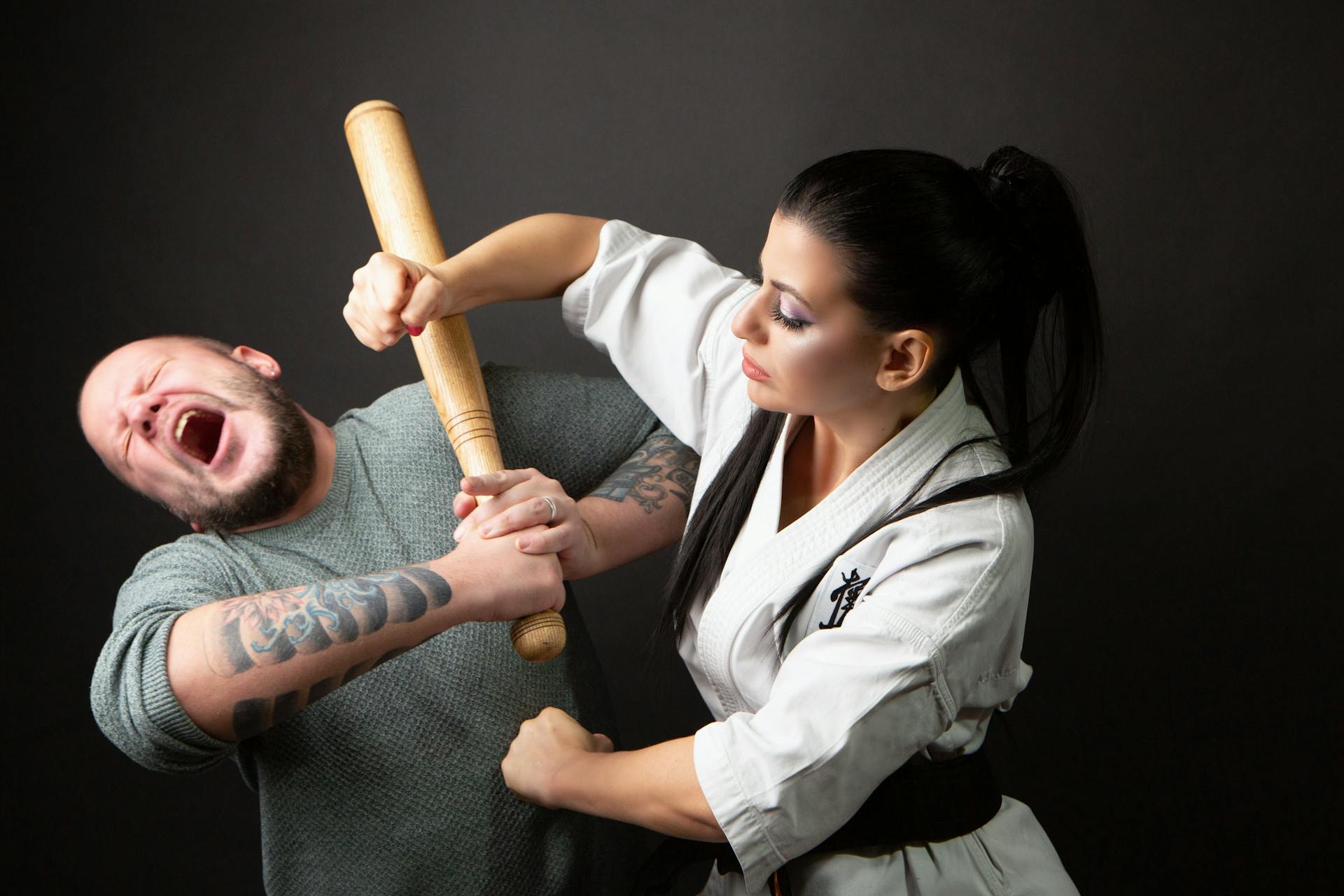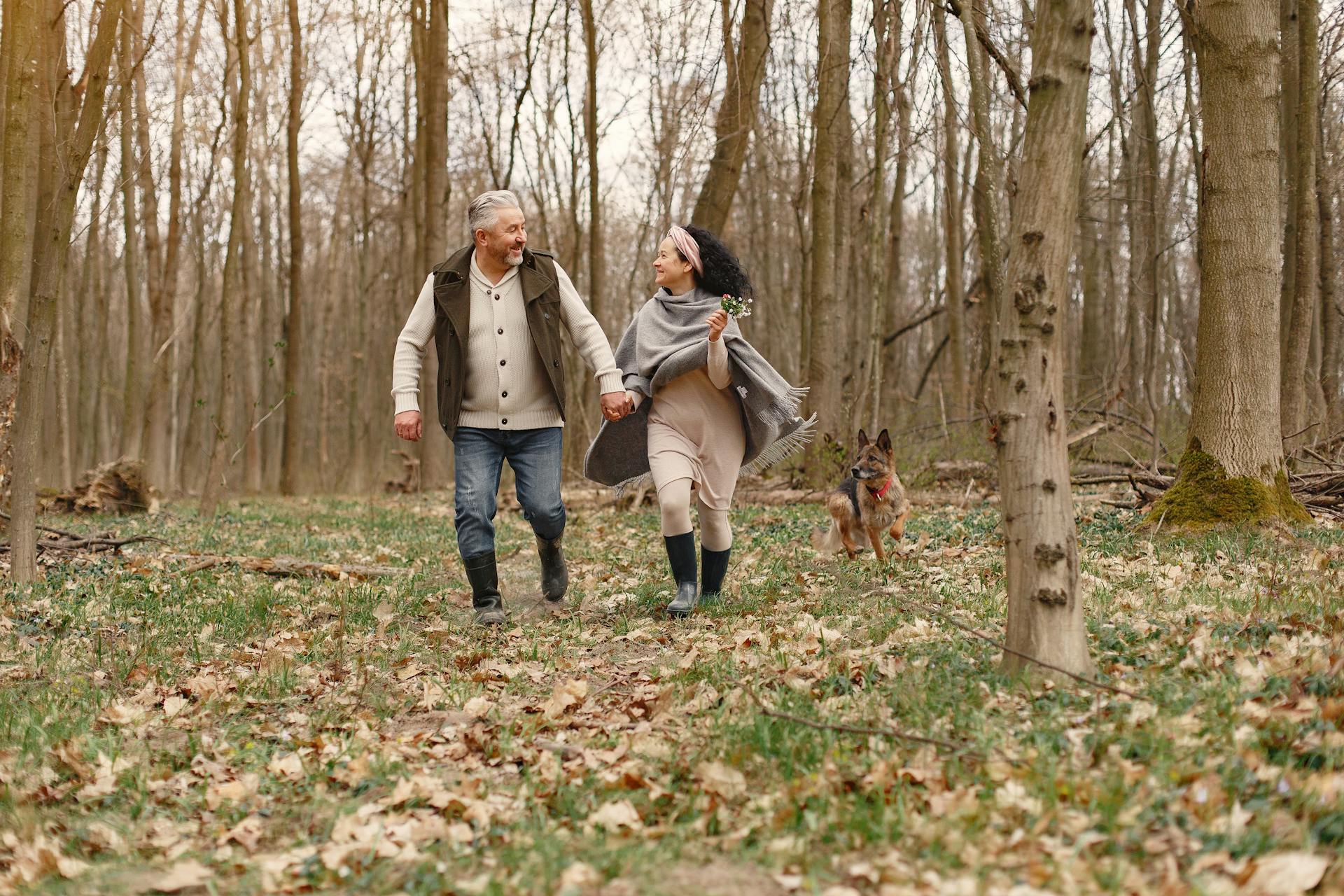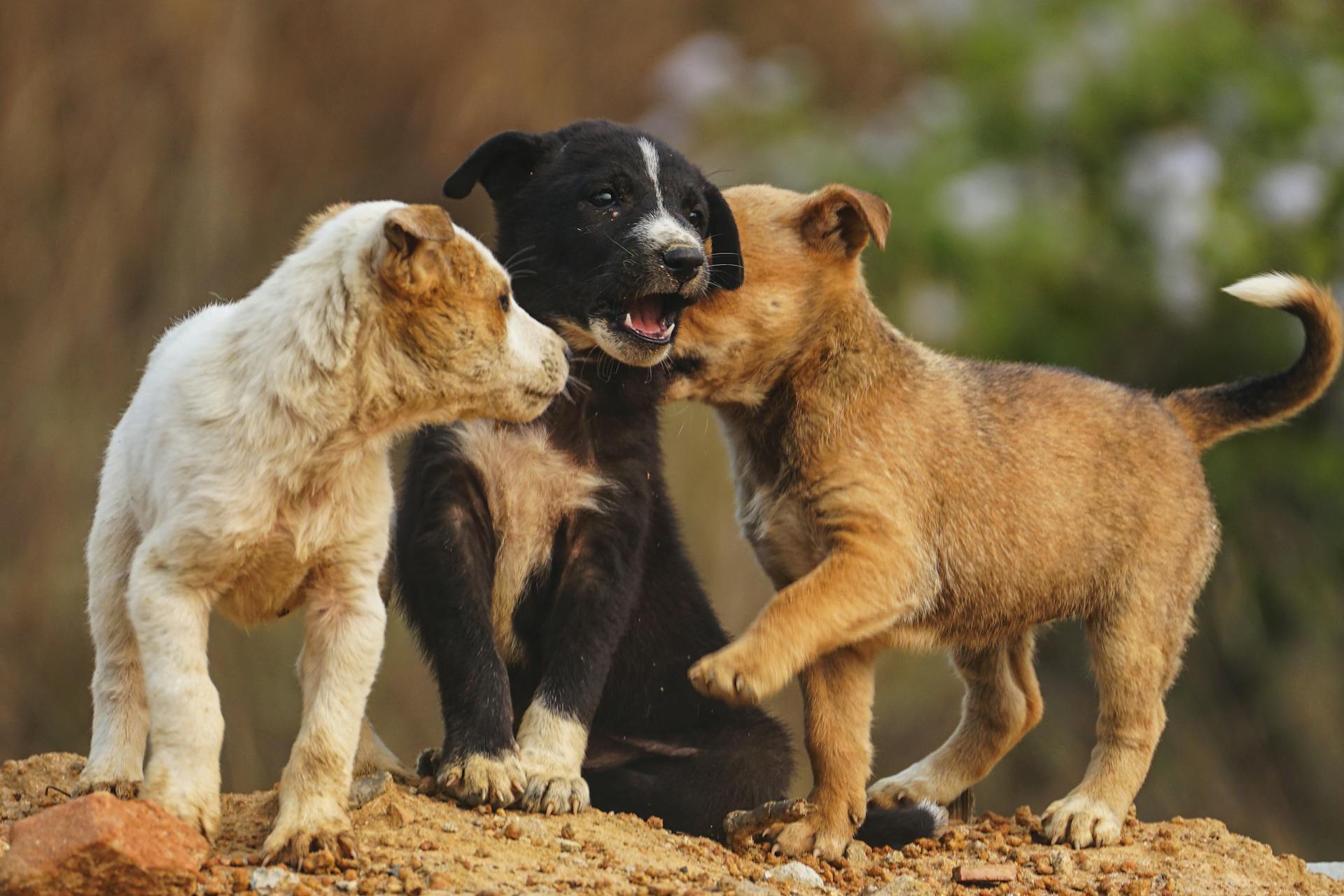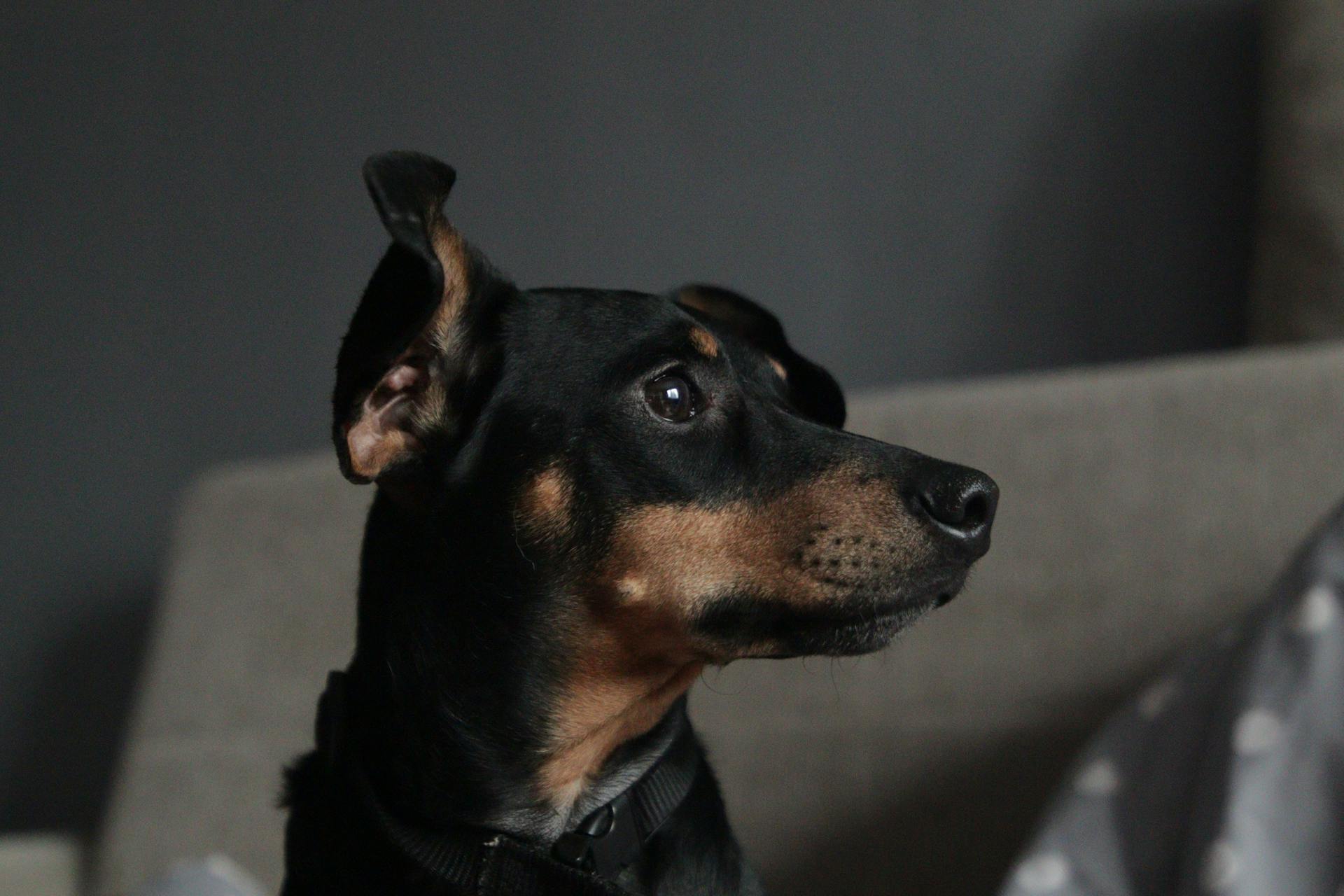
Miniature Pinschers are a popular breed, known for their intelligence, energy, and affectionate nature. They're a great choice for active families or individuals who want a loyal companion.
Male Miniature Pinschers tend to be more energetic and playful than females, requiring more exercise and mental stimulation to prevent boredom and destructive behavior.
Females, on the other hand, are often described as more affectionate and gentle, making them a great fit for families with children.
Characteristics
The Miniature Pinscher is a spirited companion with a playful personality who loves spending time with their owners. They're naturally curious and busy, always looking for the next adventure.
Their high-stepping gait is a signature trait, giving them a bold and fearless attitude. They're protective of their family and make great watchdogs, but they can be suspicious of strangers.
Miniature Pinschers are highly active and need plenty of exercise to keep them happy and healthy. They're prone to boredom and separation anxiety if left alone for too long, so they need regular attention and interaction.
Here's a breakdown of their characteristics:
They're intelligent and loyal companions, but they can be difficult to housetrain and may require extra attention and patience. With the right care and attention, they'll reward you with a lifetime of love and companionship.
History of the
The miniature pinscher has a rich history that spans several hundred years. It originated on German farms as a ratter, earning it the name "reh pinscher" due to its resemblance to the reh, a small deer that once inhabited Germany's forests.
They are likely descendants of the German pinscher, which also shares ancestry with the Doberman. The miniature pinscher actually predates the Doberman, but the two breeds share a similar appearance.
Dachshunds and Italian greyhounds are also believed to be ancestors of the miniature pinscher. This mix of breeds likely contributed to the miniature pinscher's unique characteristics.
Between 1905 and World War I, the miniature pinscher gained popularity in Germany. Breeders in Germany and Scandinavia worked to improve the breed's genetic line after World War I.
The first miniature pinschers arrived in the United States in 1919, and the breed achieved American Kennel Club recognition in 1925.
Care and Upkeep
Miniature Pinschers are high-energy dogs that require plenty of exercise to stay happy and healthy. They need abundant exercise, which can be met in a small yard or even indoors.
One thing to keep in mind is that they can jump higher than expected, so a securely fenced yard is a must to prevent escape. A tall fence is essential to keep them safe.
Miniature Pinschers enjoy chasing objects, but they're not great retrievers and tend to avoid water. This means they're not the best fit for dog parks, where they may find themselves at odds with larger dogs.
To keep them entertained and mentally stimulated, games and mental challenges are a great idea. You can also try taking them on walks on a lead to give them some exercise and attention.
Here's a quick rundown of their grooming needs:
- Brush their coat as needed, at least weekly.
- Clean their ears weekly, even as a puppy.
- Brush their teeth at least twice a week to keep them perfect.
Remember, they have low grooming needs, so you don't need to worry about spending a lot of time on their coat.
Grooming Basics
Miniature Pinschers have a short, smooth coat that requires minimal grooming. They don't shed much, but regular brushing keeps them looking their best.
Brush your Miniature Pinscher's fur weekly or daily to maintain a healthy appearance. You can use a soft brush or mitt, and it's a good idea to get them used to routine grooming tasks from a young age.
Their short coat makes them easy to groom, but they still need regular nail trims, teeth brushing, and ear cleaning. You should be able to hear their toenails click when they walk, and their nails should be clipped about every two weeks.
Bathing is also a breeze, as they can be bathed as often as needed without harming their coat. Just use a gentle dog shampoo and bathe them when they get dirty.
In cold weather, it's essential to protect your Miniature Pinscher from the elements. You can use dog sweaters and coats to keep them warm and cozy.
A fresh viewpoint: Can I Use Dog Flea Shampoo on a Cat
Training
Training is a must with miniature pinschers, and it's best to start with basic obedience lessons when they're about 8 weeks old.
They're quite smart and tend to respond well to effective training, but without it, the breed can become stubborn and unruly.
Expect to be entertained by your miniature pincher's antics, but be prepared to put in the effort to train them properly.
The key to successful training is to start early and be consistent throughout their lifetime. Training introduced at a young age will yield the best results.
Socialization must also start early to avoid excessively hostile behavior, and trainers should focus on preventing 'Small Dog Syndrome' from occurring.
Once a dog has developed 'Small Dog Syndrome', it can be incredibly difficult to reverse, so it's essential to treat your miniature pincher as the dog that it is, rather than coddling it or allowing it to be aggressive or destructive.
Temperament
The temperament of a Miniature Pinscher is a unique blend of traits that can make them a wonderful companion or a handful to deal with. They're known for being fearless and bold, always up for a challenge.
Their small size belies their big attitude, and they often act like they're the boss, even if they're the smallest dog in the room. This can sometimes lead to dominance issues and a tendency to be snappy or aggressive if not properly trained.
Miniature Pinschers are highly energetic and playful, making them a great match for families with older children who can keep up with their antics. However, they're not suitable for households with very young children, as they can be easily injured due to their small size.
Here are some key temperament traits to consider:
As you can see, Miniature Pinschers are a high-energy breed that requires regular exercise and mental stimulation to prevent boredom and destructive behavior. They're also highly intelligent and trainable, but can be stubborn at times, making consistency and positive reinforcement key to successful training.
Overall, the temperament of a Miniature Pinscher is a unique and exciting combination of traits that can make them a loving and loyal companion for the right owner.
Health
Miniature Pinschers are known to enjoy quite good health and can live well into their teens, with many individuals reaching the age of 14 or 15.
Regular brushing of your dog's teeth daily will prevent periodontal disease, which is a common issue in many breeds.
As a responsible dog owner, it's essential to be aware of the potential health disorders that may affect your Miniature Pinscher, such as degenerative heart valves, which can lead to heart failure over time.
Your Health
Your Miniature Pinscher can live well into their teens, with many individuals reaching the age of 14 or 15.
Brushing your dog's teeth daily is a crucial habit to prevent periodontal disease, which can be a significant health concern for Miniature Pinschers.
Miniature Pinschers are prone to certain health disorders, including heart problems that can lead to heart failure over time.
Degenerative valves in the heart can cause heart failure, but regular check-ups and monitoring can help identify any issues early on.
It's essential to be aware of these potential health concerns and work with your veterinarian to develop a preventive health plan tailored to your dog's needs.
Discover more: Why Does My Male Dog Lick My Female Dogs Pee
Spay or Neuter
Spaying or neutering your Min Pin is one of the best things you can do for their health.
This surgery decreases the likelihood of certain types of cancers.
By spaying or neutering your pet, you eliminate the possibility of them becoming pregnant or fathering unwanted puppies.
Performing this surgery also gives us a chance to identify and address diseases your dog is likely to develop, such as hip problems or dental issues.
Routine blood testing prior to surgery helps us identify and take precautions for common problems that increase anesthetic or surgical risk.
We'll discuss the specific problems we'll be looking for when the time arrives, so you can be prepared and make informed decisions about your pet's care.
Exercise and Activity
A Miniature Pinscher needs to stay active to stay happy. They require a moderate amount of exercise, which means 30 to 60-minute on-lead walks and plenty of playtime.
Off-lead walking is not recommended, as they have a strong instinct to chase small creatures and may not be trusted with other dogs. This is especially true if you're not careful.
Broaden your view: Male Dog Not Interested in Female in Heat
A securely fenced garden is a must, as they love to dig and get messy. You can expect your lawn to be constantly manicured if you don't take steps to prevent this.
In addition to physical exercise, Miniature Pinschers also need mental stimulation to prevent negative behaviors like constant yapping or digging. This can be achieved with interactive activities and playtime.
Here's a quick rundown of what you can expect in terms of exercise needs:
Remember to keep an eye on your Miniature Pinscher's energy levels and adjust their exercise routine accordingly. They may need more or less exercise depending on their individual needs and age.
Breed
The breed of a miniature Pinscher can have a significant impact on their behavior and personality. Miniature Pinschers are a small breed of dog that originated in Germany.
Males tend to be slightly larger than females, with an average weight of 8-12 pounds and a height of 10-11 inches at the shoulder. Females, on the other hand, typically weigh between 7-11 pounds and stand about 9-10 inches tall.
In terms of temperament, both males and females are known for being energetic, curious, and playful.
If this caught your attention, see: Can a Spayed Female Dog Still Attract Males
Breed Data
The Miniature Pinscher is a beloved breed known for its small stature and big personality. They originated in Germany and are part of the toy breed group.
Here are some key stats about this breed:
Their "hackney" gait is quite distinctive, a high-stepping prance that's reminiscent of a trotting Hackney horse. This unique gait is just one of the many characteristics that set the Miniature Pinscher apart.
Breed Details
The Min Pin is a compact companion, standing between 10 to 12.5 inches tall at the shoulder.
You can expect your Min Pin to weigh between 8 to 11 pounds, making them a great fit for apartment living.
Min Pins are capable of learning quickly, even from a young age. In fact, they can start soaking up training as early as 8 or 10 weeks old.
Here are the key breed details:
- Height: 10 to 12.5 inches at the shoulder
- Weight: 8 to 11 pounds
What a Breed
The Miniature Pinscher is a unique breed that's full of personality. They're alert, curious, and busy, making them entertaining companions.
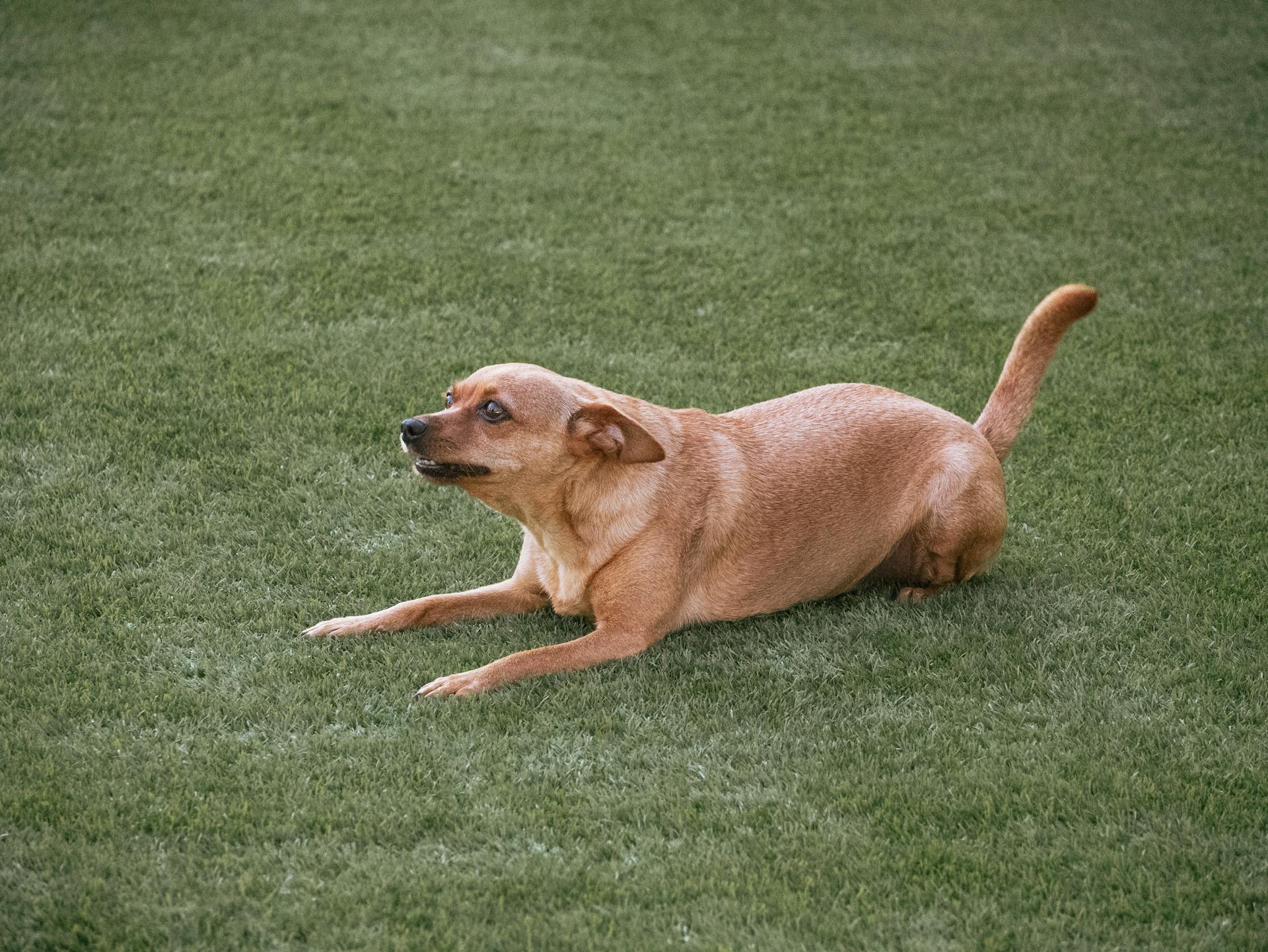
They're protective of their family, which makes them good watchdogs. But, they can be suspicious of strangers, so socialization is key.
Miniature Pinschers are outgoing and playful, with a bold and fearless attitude. They're lively and friendly, always up for an adventure.
However, they can be prone to boredom and separation anxiety if left alone for too long. They'll find trouble if they get bored, so make sure to provide plenty of exercise and mental stimulation.
Their strong prey drive means they'll chase and grab anything that runs, including cats and children. So, be careful when introducing them to other pets or young kids.
Despite their quirks, Miniature Pinschers are intelligent and loyal companions. They're naturally inquisitive and always on the go, which can be tiring but also endearing.
Here are some key characteristics of the Miniature Pinscher breed:
- Alert, curious, and busy
- Protective of family: good watchdog
- Outgoing, playful personality
- Bold, steady, and fearless
- Lively, with a friendly personality
- Quirky, entertaining personality
Sources
- https://www.thesprucepets.com/breed-profile-miniature-pinscher-1117981
- https://www.britannica.com/animal/miniature-pinscher
- https://www.dogzone.com/breeds/miniature-pinscher/
- https://www.vetstreet.com/dogs/miniature-pinscher
- https://milleranimalhospitalnc.com/client-resources/breed-info/miniature-pinscher/
Featured Images: pexels.com
